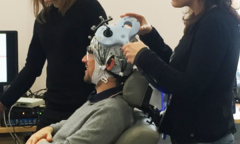Transcranial Magnetic Stimulation (TMS)
subtitle: Genomics
Transcranial Magnetic Stimulation (TMS) is a non-invasive and painless technique, using a powerful magnetic field, similar to that used in an MRI scanner. This is used to stimulate a small region of the brain. For example, if we stimulate the brain region controlling movement, it will cause a measurable muscle twitch.
Developing a hub for genomics data analysis and clinical data interpretation
subtitle: Genomics
Bioinformatics uses computer programming to analyse or interpret the huge amount of data a sequenced genome produces. This will help us to understand the genetic architecture of the epilepsies and accelerate precision treatment for epilepsy.
Our research
Neuroimaging
Neuroimaging enables us to look deep inside the brain to learn more about the impact of seizures on its structure and function.
Neuropathology
The Epilepsy Society Brain and Tissue Bank is the first of its kind in the UK. It is dedicated to the study of epilepsy through brain and other tissue samples.
Genomics
Read how we are working to understand the genetic architecture of each individual person's epilepsy through our world leading genomics research programme.






